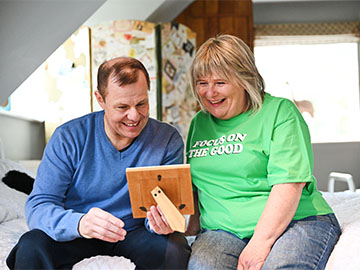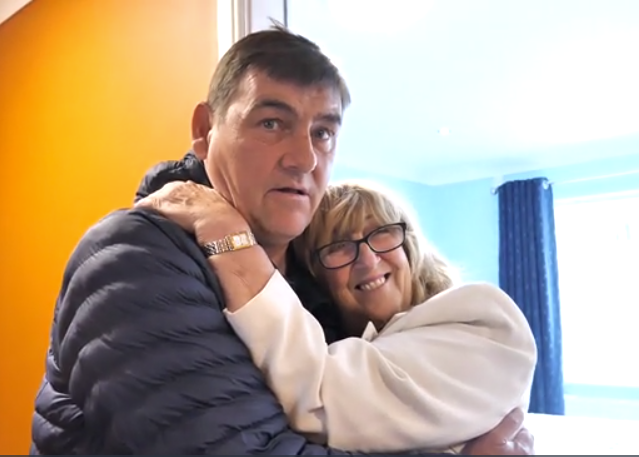Music therapy supports Alan to deliver a powerful message through song
Before his brain injury, Alan – a person we support at 46 London Road – lived an active lifestyle typical of any young man. Always on the go, he balanced a thriving career with a vibrant personal life, pursuing his passions and making the most of each day.
In the mid-1990s, Alan embarked on an exciting adventure and spent some time working abroad. One day, his adventures were suddenly cut short when he was involved in a motorcycle accident.
As Alan lay in the road, awaiting emergency rescue, his physical condition didn’t reveal the full extent of the injuries he’d sustained far beneath the surface. In that moment, the course of his future had changed forever.
Alan and his family bravely navigated the first few years of his brain injury. Eventually, his complex needs meant he needed specialist support. That’s when Alan and his family discovered 46 London Road.
With expert person-centred support, Alan has navigated his needs and re-established his passions and zest for life. Through tailored therapy provision, including Neuro Music Therapy, Alan has reflected upon his life following his brain injury, and composed a song with a powerful message to the world.
Adventures and challenges
Alan was born in Scotland in 1978. Throughout his younger years, he was active, sociable, and enjoyed being with others. He took care of his health and was a regular gym-goer. Alan also pursued his passion for music – especially Scottish rock bands, like Snow Patrol and Franz Ferdinand.
After he left school, Alan began a career as a Sales Consultant, regularly journeying through the UK on business trips. Not one to shy away from adventures and challenges, he jumped at the chance to travel to America for work.
Alan enjoyed life across the pond, embracing the thrills and spills of his great American adventure. A motorcycle enthusiast, he often took to cruising down America’s dusty highways, taking in the beautiful landscape that wrapped around him.
Tragically, in 1996, Alan was riding his motorcycle when he was involved in a road traffic accident. The impact of the crash left him severely injured and in a coma. Away from home, Alan’s injuries were treated in America until he was stable enough to return to the UK for further rehabilitation.
Returning home
Alan had many additional needs because of his brain injury. With his mobility affected, he needed support in many areas of his life. Initially, he returned home to his mum and dad. Together, they rallied round Alan, supporting his needs and giving him the best quality of life possible.
While living with his mum and dad, Alan attended a local college for people with disabilities and additional needs. Spending his days there, Alan reestablished the structure his career gave him before his accident.
He rekindled his love for being active and engaged in therapeutic activities, such as art, accessible woodworking, and physical activities like swimming.
Because of his brain injury, Alan could no longer walk unaided and relied on a wheelchair to get around. He also had speech impairments and dysphagia, affecting his capacity to swallow food and liquid.
Following his accident, Alan began experiencing some alterations to his mood and mental health difficulties. Occasionally, he would become withdrawn and isolate himself from others – a behaviour he didn’t experience before his brain injury.
Even though Alan was obliging to try any activity at college, his complex needs required specialist support.
With Alan’s brain injury affecting him more profoundly than he and his family originally thought, they started to look for expert rehabilitation support. That’s when they found 46 London Road in 2006.
Steps towards in independence
A naturally sociable person, Alan’s transition to London Road was seamless. He enjoyed socialising with his housemates and enjoyed the company of his compassionate, family-orientated support team. Solidifying an unexpected step towards independence, Alan found a home where he could thrive.
With oversight from a Clinical Nurse Manager and Therapy Lead, his expert team effectively managed his dysphagia. Delivering a modified diet, they ensured he received a varied menu tailored to his tastes.
Our team also engaged Alan with a Speech and Language Therapist (SALT), who supported him to redevelop the muscles in his face and throat, improving his swallowing and verbal communication skills.
With his wellbeing comfortably managed, Alan and his support started to set some goals for him to work towards. Incorporating his passions and interests, they planned out functional activities to help him reach them.
Always willing to participate, Alan was a force to be reckoned with as he smashed through his goals! Quickly, he became a source of inspiration to everyone he met.
Naturally kind and loving, Alan made time for everybody and was a popular member of the household. But as time went on, Alan showed signs of withdrawing and isolating himself again. Concerned about his mental health, his team worked with him to explore the emotions with which he was struggling.
A family-orientated man, our team identified that Alan missed his parents. His team arranged regular meetings and activities with his family and, as Alan settled into his new home, he started visiting his family home for occasions and weekend breaks.
Alan’s brain injury affected his memory, and he would sometimes talk about going back to work. Recognising how important his career was to him – and the self-esteem it gave him – his support team established ways to give his days more purpose. Engaging him with the local Headway group, who held regular social events for people with brain injuries, Alan keenly started attending every week.
Understanding the complexities of mental health following a brain injury, our team identified a need for engaging Alan with therapy. Knowing how much he loved music, Neuro Music Therapy seemed like the natural choice – and would be a decision that changed the course of Alan’s future.
Creative self-expression
Neuro Music Therapy is a special type of Psychotherapy where music is used to express emotions by playing instruments, singing, and writing songs.
Differing from traditional Music Therapy, it follows a specific program to target the areas of the brain that connect with music. As well as mental health support, it also helps people with brain injuries to regain lost skills and improve their mobility.
Before starting his therapy sessions, Alan expressed to his support team that he wanted to improve his mobility. Paired with his emotional needs, they knew Neuro Music Therapy was the ideal approach for him and enlisted Alan’s new therapist, Vicky from our creative therapies partner Chroma.
Alan’s initial referral to Vicky was based around his goals to improve his emotional wellbeing and support his verbal communication. But Neuro Music Therapy gifted Alan with so much more. In his sessions, he explored his creativity and found new ways to express the feelings about his brain injury that were buried deep within him.

Neuro Music Therapy quickly had a positive effect on Alan’s mental health. Reconnecting him with his passion for music in a unique way, music became a focal point of his days and provided the purpose and structure he’d been searching for!
Directing sessions around Alan’s needs and how he felt in the moment, Vicky expertly tailored exercises and activities so he would still work towards his overarching goals. She also remained flexible to his preferences for activities.
Quickly, she noticed Alan was drawn to song writing and reviewing other artists’ music. So, together, they set pen to paper and got to work on Alan’s first big hit!
Alan’s big hit
During one of his therapy sessions, Alan felt a sudden wave of inspiration. Listening to a song in the charts, a particular lyric stood out to him. Touching his heart, it was just the catalyst he needed to start writing his own song.
Over the course of his music therapy, Alan identified profound feelings about himself following his brain injury, which naturally set the framework for his song. He knew the theme would resonate with others, so he bravely got to work on crafting a special message to share with the world.
Before his brain injury, Alan seized opportunities and made the most of life. Young and carefree, he had the world at his feet – until his road traffic accident. Through his song, Alan wanted to communicate to others the importance of living life to its fullest and never passing up opportunities.
Collaborating with his therapist Vicky, Alan quickly moved nearer to his goal of completing his first song. Penning all the lyrics himself during his music therapy sessions, Vicky was impressed by how quickly he crafted such powerful words.
When Alan was ready to create the accompanying melody, he listened to various songs with Vicky. Once he established his sound, Vicky composed the music and played different melodies on her piano for him.
Alan made the final creative decisions, and a hit was at his fingertips! Soon after Alan’s song was finalised, an opportunity arose for it to be professionally recorded.

Vicky and her fellow therapists at Chroma embarked on a project to create an album of songs created with their therapy clients. Immediately, Alan sprang to mind. Vicky knew what it would mean to him to have his song recorded. So, she set to work to make this happen.
On production day, Alan couldn’t attend the recording studio with Vicky, but was included throughout the entire process and had the final say about every detail. Streaming the recording session to him online, Alan fondly watched on as Vicky brought his song to life.
Belief through beauty
Often, people with brain injuries might feel like they aren’t taken seriously. This is particularly common early on in their care, when they might have more things done for them, rather than with them. They can feel lost within themselves and become anxious about expressing themselves.
Alan had become withdrawn and struggled to communicate after his brain injury – until our expert team engaged him with Neuro Music Therapy. Through this, he was able to rediscover the power of his own voice and the value in expressing his thoughts and feelings.
By writing his song, he was able to communicate emotions he secretly struggled with after his brain injury: inclusion and acceptance.
Alan was overjoyed when his song was professionally recorded. To have his message and creativity taken seriously filled him with indescribable joy.
Since they first met, Alan and Vicky have navigated a special journey together in their therapy sessions. She has seen significant changes in his verbal communication, improvements in his mobility and, most importantly, she’s seen his belief in himself grow.
By tapping into his creativity, Alan has witnessed the power of the words we say and how they can be used to create something beautiful – just like his song.

Find out more!
If you’d like to find out more about our specialist brain injury rehabilitation support and how it could help you, a loved one or a client, fill out our simple form and a member of our friendly team will be in touch.

 Brain injury rehab
Brain injury rehab  More success stories
More success stories 




